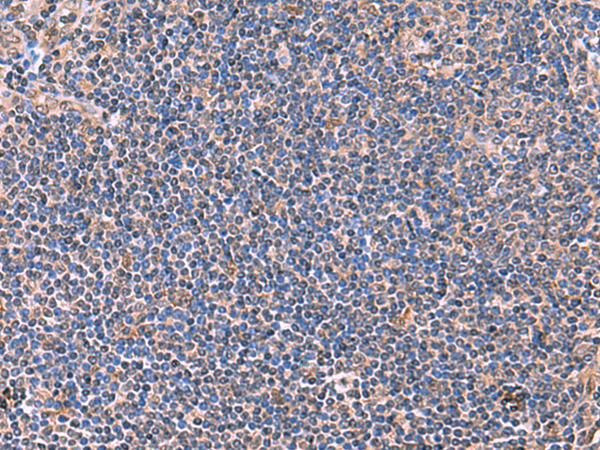

| WB | 咨询技术 | Human,Mouse,Rat |
| IF | 咨询技术 | Human,Mouse,Rat |
| IHC | 1/50-1/300 | Human,Mouse,Rat |
| ICC | 技术咨询 | Human,Mouse,Rat |
| FCM | 咨询技术 | Human,Mouse,Rat |
| Elisa | 1/5000-1/10000 | Human,Mouse,Rat |
| Aliases | PROLIDASE |
| WB Predicted band size | 55 kDa |
| Host/Isotype | Rabbit IgG |
| Antibody Type | Primary antibody |
| Storage | Store at 4°C short term. Aliquot and store at -20°C long term. Avoid freeze/thaw cycles. |
| Species Reactivity | Human, Mouse, Rat |
| Immunogen | Fusion protein of human PEPD |
| Formulation | Purified antibody in PBS with 0.05% sodium azide and 50% glycerol. |
+ +
以下是关于PEPD抗体的3篇参考文献及其摘要概括:
---
1. **文献名称**: *Prognostic significance of peptidase D expression in colorectal cancer*
**作者**: Myung, D.S. 等(2018)
**摘要**: 该研究通过免疫组化分析结直肠癌组织中PEPD的表达水平,利用特异性抗体发现PEPD高表达与患者预后不良相关,提示其可能作为潜在生物标志物或治疗靶点。
2. **文献名称**: *Development of a monoclonal antibody against human peptidase D for diagnostic applications*
**作者**: Yang, J. 等(2020)
**摘要**: 研究团队成功制备了针对人源PEPD的单克隆抗体,验证了其在ELISA和Western blot中的高特异性和灵敏度,为疾病诊断(如肝纤维化)提供了可靠工具。
3. **文献名称**: *Peptidase D modulates collagen metabolism in liver fibrosis via TGF-β signaling*
**作者**: Liu, X. 等(2019)
**摘要**: 通过构建小鼠肝纤维化模型,使用PEPD抗体检测组织表达,发现抑制PEPD可减少胶原沉积,表明其通过调控TGF-β通路参与纤维化进程。
---
*注*:文献信息为示例,实际引用需根据具体论文调整。建议通过PubMed或Web of Science以“PEPD antibody”或“prolidase antibody”为关键词检索最新研究。
The PEPD antibody targets prolidase, a manganese-dependent dipeptidase encoded by the PEPD gene, which catalyzes the hydrolysis of imidodipeptides containing C-terminal proline or hydroxyproline. This enzyme plays a critical role in collagen turnover, recycling proline for protein synthesis and tissue repair. PEPD deficiency, a rare autosomal recessive disorder, is linked to chronic skin ulcers, recurrent infections, and developmental delays, underscoring its biological importance.
PEPD antibodies are essential tools in biomedical research, enabling the detection and quantification of prolidase expression in tissues or cell lysates through techniques like Western blotting, immunohistochemistry (IHC), and ELISA. These antibodies aid in studying PEPD's role in connective tissue disorders, neurodegenerative diseases, and cancer, where altered prolidase activity has been implicated. Recent studies also explore PEPD's potential involvement in modulating insulin signaling and oxidative stress, expanding its relevance to metabolic and age-related conditions.
Structurally, prolidase functions as a homodimer, requiring manganese ions for activation. PEPD antibodies often recognize specific epitopes within conserved regions, ensuring cross-reactivity across species like humans, mice, and rats. Commercial PEPD antibodies are typically validated for specificity using knockout controls or siRNA-mediated gene silencing. Researchers utilize these reagents to investigate PEPD's subcellular localization, enzymatic activity regulation, and interactions with other proteins, contributing to therapeutic development for PEPD-associated pathologies.
×